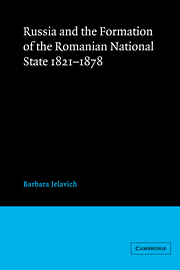Book contents
- Frontmatter
- Contents
- List of maps and illustrations
- Preface
- Introduction: The establishment of Russian influence in the Danubian Principalities
- I The Russian protectorate
- II The European guardianship
- III The Cuza era, 1859–1866
- IV Prince Charles, 1866–1871
- V Prince Charles, 1871–1878: the Eastern crisis
- Conclusion
- Notes
- Bibliography
- Index
- Plate section
II - The European guardianship
Published online by Cambridge University Press: 18 December 2009
- Frontmatter
- Contents
- List of maps and illustrations
- Preface
- Introduction: The establishment of Russian influence in the Danubian Principalities
- I The Russian protectorate
- II The European guardianship
- III The Cuza era, 1859–1866
- IV Prince Charles, 1866–1871
- V Prince Charles, 1871–1878: the Eastern crisis
- Conclusion
- Notes
- Bibliography
- Index
- Plate section
Summary
The Treaty of Paris opened a new era in European diplomacy, one that was to be characterized by victories for the German and Italian, as well as for the Romanian, national movements. Since there was as yet no representative Romanian administration, the fate of the country lay primarily in the hands of the great powers. The decisions were to be made no longer by one power, in collaboration with the Porte, but by a concert of the seven signatories of the treaty. The rivalry among these governments was to be a great advantage for the Romanian leadership over the next years.
The Crimean disaster compelled a change of policy in the Russian relationship with the Principalities, as well as in other areas of international relations. The humiliation of the defeat and the dangers that had arisen during the war forced the Russian government to consider radically different courses of action. Alexander II regarded the treaty as a national humiliation and a stain on his personal honor. The breaking of the terms of the agreement that were damaging to Russia thus had first priority for the future. Four aspects of the settlement, in particular, had profoundly altered the Russian diplomatic position in the Near East: the neutralization of the Black Sea, the cession of the three districts of southern Bessarabia, the loss of a special position in relation to Constantinople, and the assumption by the powers of additional guarantees for the Porte.
- Type
- Chapter
- Information
- Publisher: Cambridge University PressPrint publication year: 1984

